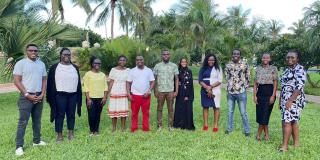
"My name is Nelson Onyimbi, and I’m a national volunteer for the ACTIVE project in Kilifi, Kenya, serving as a Sexual Reproductive Health and Rights Advisor since November 2022.
I grew up in Kisumu, near Lake Victoria, in a community primarily inhabited by the Luwo and Luhya. I have three brothers and two sisters.
After completing my early schooling in Kisumu, I attended Maseno School, located about 40 km away, and later Maseno University, where I studied economics. During my time in college, I served as a peer educator with I Choose Life Africa (ICL), focusing on peer education, information dissemination, communication, behaviour change, and active health rights education. This experience deepened my commitment to community health advocacy. Following this role, I volunteered with Naya Kenya, where I engaged in writing for national newspapers and advocated for policy changes, with an emphasis on inclusion and budget advocacy.
Additionally, I co-founded an organisation called Etonogo Bunga with a friend, collaborating closely with YSD Kisumu to promote social accountability. These experiences collectively led me to a career focused on sexual reproductive health and rights, a cause I’m passionate about continuing here in Kilifi.
How did you learn about VSO?
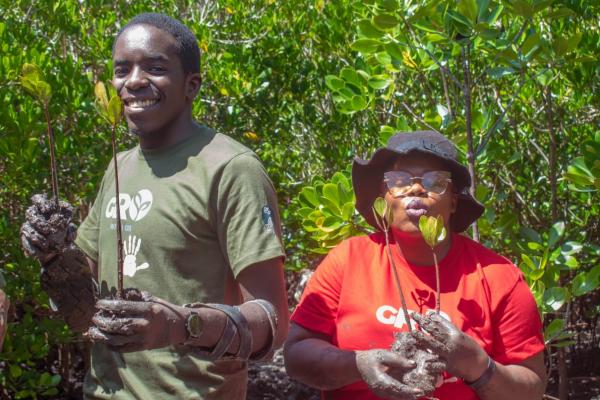
In 2019, VSO began establishing chapters of Youth for Sustainable Development (YSD) across many of Kenya’s 47 counties. By February 2020, just before the pandemic, a friend invited me to a life skills training with YSD, which enabled us to become trainers ourselves.
Unfortunately, just a month later, the government announced a lockdown, halting our plans. During the pandemic, however, we organised through the Kisumu Youth Caucus, collaborating with the government to implement Ministry of Health COVID-19 containment measures. This included distributing sanitisers, hand-washing stations, and protective gear to traders, boda riders, and students.
As transportation was limited and motorcyclists became a primary means of travel, we worked with the Kisumu County government and other organisations to supply motorcyclists with masks, sanitisers, and reflector vests with COVID-19 safety messages for travellers to read and protect themselves.
Can you describe the project you're working on and the focus of your role in it?
The project I’m working on is the ACTIVE project, which stands for Active Citizenship Through Inclusive Volunteering and Empowerment. This project is part of VSO’s broader mission and integrates the organisation’s three main pillars: education, livelihoods, and health.
Our work focuses on empowering citizens to understand and advocate for their rights while fostering partnerships with healthcare providers and policymakers to ensure that policies are responsive to community needs. In my role as a Sexual Reproductive Health and Rights Advisor, I guide and support these efforts by providing expertise on health rights, working to raise awareness, and helping build a policy environment that champions inclusive and accessible healthcare services.
How did the community respond to you when you started the project?
We work with community volunteers, national volunteers, and international volunteers. The presence of community volunteers made it a little bit easier for us to move into the community; I think this is the mistake a lot of other organisations make – they just move into communities without the community seeing some of themselves in the project.
With VSO, people see at least one or two of their own community in the project, they know that it really does have their input and is targeted to solve some of the issues they have."
With VSO, people see at least one or two of their own community in the project, they know that it really does have their input and is targeted to solve some of the issues they have. The community volunteers helped us a lot in introducing the project to the community first.
How did you find working with different types of volunteers contributes to your personal and professional development?
About two months ago we had an international volunteer called Koshiki from the UK. We worked around some of the collectives we have – small groups that represent a bigger group, for example the fisher folk, who deal with fishing, boats, and the whole supply chain of fishing. We also have collectives that work with forest management, women’s groups, peer educators, students, and climate change.
We were able to visit some of these collectives and government officials that we work with, conducting a study to try and tighten any gaps. We wanted to find ways to improve in the new year, to ensure there are no loopholes in our working relationship.
Most of the feedback we got really did show that close working relationship, and even the governor himself was aware of the work that we do in this county. It was very encouraging to know how much impact we've had in just over a year.
What shifts have you observed in the community’s mindset and behaviours since the project began?

We have encouraged the uptake of public participation, so that the community takes consideration of participating in government affairs. For the longest time, the community members always thought that it's not necessary to take part in things like shaping projects in the community, so whenever public participation forums are called, you'd find not a lot of people would be keen to attend them. We've been able to show that these forums are vital for improving local conditions and advocating for necessary developments like medical facilities, schools, and water infrastructure.
They've also been able to use the right channels to find out the progress of a project or initiatives – they can ask, “What's the progress of the health centre you promised us?” or “How can we make that better as a community working with the government?”. They're no longer afraid of the government as an enemy of the people, they can approach the government, hold dialogue, and agree on a few issues here and there.
The local government has also shifted in terms of inclusion. Because social inclusion is one of the major pillars of VSO and as ACTIVE, it has been taken into a lot of consideration in terms of budget allocations and project spaces. Where the government hosts an audience, they usually make sure that there's a sign language interpreter and support for people with low vision or are blind, so nobody is left behind.
We've also been able to work a lot in the policy papers, contributing technical assistance to the development of the Climate Change Act, the Disability Act, youth policy, the reproductive maternal and neonatal child and adolescent health bills, the Gender-Based Violence Act. We’ve even contributed to the county’s integrated development plan, which is the five-year plan for the county, especially when it comes to social inclusion and volunteering clauses.
What’s been your biggest challenge on the project?
ACTIVE is primarily an advocacy-based project, and many community members aren’t yet familiar with this approach. Previously, most development partners in Kilifi would hold meetings with the community and offer small tokens for attendance. As a result, many community members attended simply for the token rather than to actively engage or work toward meaningful change.
With ACTIVE, we’re focused on advocacy that goes beyond attendance; we follow up to ensure progress. We aim to leave community members better equipped than when we found them, moving past the idea of just attending a meeting for a token."
With ACTIVE, we’re focused on advocacy that goes beyond attendance; we follow up to ensure progress. We aim to leave community members better equipped than when we found them, moving past the idea of just attending a meeting for a token. Initially, it was challenging to shift this mindset, but over time, it’s improved. Now, we can hold productive dialogues and community forums that see genuine engagement.
Could you describe someone who’s been instrumental in supporting you both professionally and personally on the project?
We’ve worked extensively with the community to organise meetings where we contribute our insights on social accountability, especially around social inclusion and volunteerism in policymaking. For a long time, many county policy documents lacked clauses that supported volunteerism or prioritized social inclusion, so when technical guidance was needed, we provided input. We've contributed to significant legislation, such as the Climate Change Act, the Disability Act, the Reproductive, Maternal, Neonatal, Child, and Adolescent Health bill (currently under formation), the Gender-Based Violence bill, and the Youth Policy, which was recently launched.
One collective I’d especially like to highlight is Kilifi Youth on the Move (KYOM). They do incredible work in education, primarily composed of unemployed youth with backgrounds in teaching. KYOM provides informal classes to young people who have left school, helping them register for national exams to earn a secondary school education certificate—a crucial qualification for many jobs here.
We've actively supported KYOM’s educational programmes and even participated in their podcast. We aim to amplify their efforts and showcase the valuable work they’re doing and how our collaboration supports it.
How would you describe your typical day?
For us in Kilifi, we share an office space with an organisation called Kesho Kenya, who also do a lot of work in education, but we also have the option of working from home whenever it's convenient.
My typical day would involve going to the office, checking out if I have a lot of backlogs, if I have meetings with development or government partners, or we have community forums. In a day we'd attend one or two of those.
We break down our quarterly plans into monthly plans and weekly plans and daily plans, so we can follow that through. Of course, sometimes something comes up that wasn't factored in the plan, so we distribute that among amongst ourselves. We have four community volunteers and four national volunteers so we'd agree who will represent us at which meetings. Then at the end of the day we have our WhatsApp group for the briefing, we talk about how the day went, the successes, and what needs to be improved.
What motivates you to continue volunteering?
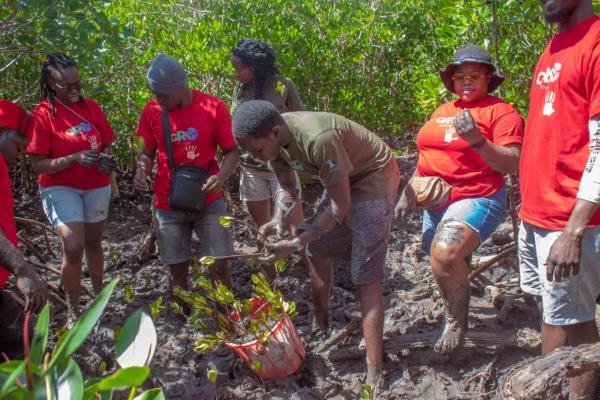
There's a quote by a Robert Anton Williams, which says, “under the present brutal and primitive conditions on this planet, every person you meet should be regarded as one of the walking wounded. we have never seen a man or woman not slightly deranged by either anxiety or grief. we have never seen a totally sane human being.”
You can look at the people you are working with and, even though they won’t say it explicitly, assume that they are going through something and could be in a dark corner. It could be they don't want to talk to anybody, but the least you can do is just be kind to them, don't make life any bit tougher for them, try to speak to them nicely, try to offer a helping hand whenever you can, try to make them smile, laugh, whichever way you can.
At the end of the day, we're supposed to be making it a little bit lighter for the next person.
What do you think about volunteering as an approach to development, and how does VSO stand out among other NGOs?
Volunteering, in my view, is unique because it often starts with a genuine desire to contribute positively to society. Volunteers usually aren’t motivated by financial gain; they do it because they believe in making a difference. In contrast, I’ve seen that in some traditional workplaces, there can be a lack of motivation—people may go through the motions without urgency to improve. With volunteering, the intention is different, and that intention creates a drive to make things better, regardless of compensation.
VSO really stands out in how it supports volunteers throughout this journey. I know that when I go into the community, I’m fully supported—my travel, meals, and safeguarding are all taken care of, and there’s medical assistance available if needed. VSO ensures I can focus on the work rather than worry about logistical or safety issues.
Additionally, VSO provides extensive training and learning opportunities, like the Kaya online courses, which cover essential topics such as compliance and safeguarding. These resources mean that, as a volunteer, I come away not only having contributed but also having developed my skills.
This development focus is something that many other organisations overlook. While some NGOs rely heavily on volunteers, they often exhaust them without offering much in return, like further training or educational growth.
VSO truly invests in its volunteers, allowing them to grow personally and professionally. Volunteering, especially with VSO, brings together people who share a commitment to positive change, and it’s through this collaboration that ideas grow into something greater than what any of us could achieve alone.
What skills have you gained since joining the project?
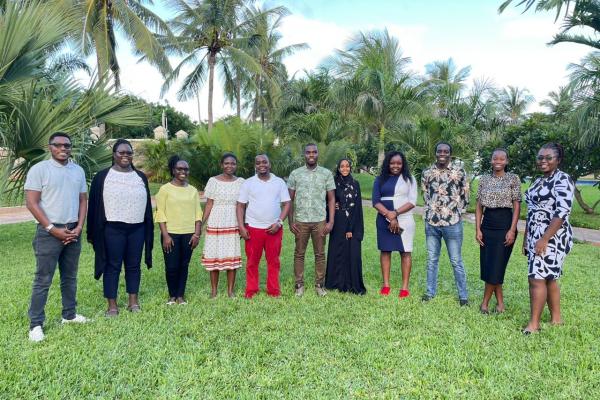
One of the skills is partnership-building and networking. We're exposed to ministries, we're exposed to local government, we're exposed to the national government, and even international development partners. For example, the other day we went to a conference in Kigali, Rwanda, and I was manning the booth, and I found a good opportunity to pull in a few interested parties who liked the work that we do. Partnership-building and networking has become something that I'm very good at and getting better every day.
Another skill is facilitation, because sometimes the work that we do involves guiding and talking to an audience. Facilitation develops other skills, and you learn to communicate better, you become more patient, and you deliver your content in a more compelling way. You can resolve problems more efficiently through communication.
What would you tell someone who is considering volunteering with VSO?
They need to look at volunteering as a long-term investment. Sometimes people look at a six-month contract and think that’s all it is, but you have a lot of opportunities for growth within VSO and some of us have been able to even get recommended for scholarships and other jobs. Looking to the long term is the whole idea of VSO.
How do you think VSO volunteers make an impact on the community?
Volunteering is a stepping stone to learning about the community and attracting wider opportunities for that community nationally, regionally, and internationally. When we had the ICS (International Citizen Service Programme) when you learn about a community and then you go back to where you work it's easy for you to develop solutions because you already know what the challenges are now you can to sit down share ideas and have like concrete evidence-based or data-driven solutions for those issues."
The ACTIVE programme
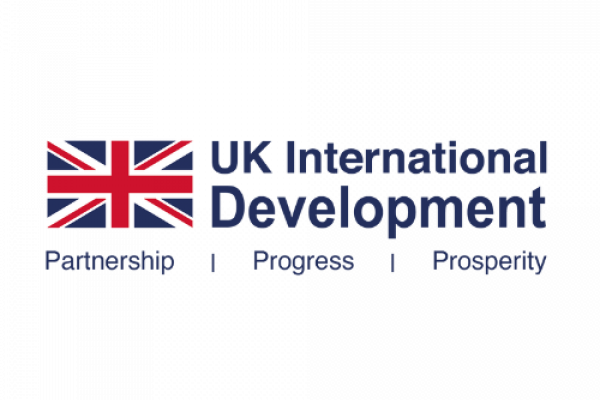
ACTIVE aims to reach 2.5 million people across 19 countries - Bangladesh, Cambodia, eSwatini, Kenya, Malawi, Mozambique, Nepal, Nigeria, Rwanda, Sierra Leone, Tanzania, Uganda and Zambia - by mobilising marginalised groups, such as women, young people and those with disabilities, to act on the issues that are most important to them and their communities.
This funding will help strengthen locally led organisations and create a culture of active citizenship – where marginalised people actively engage with their own development - whilst building the capacity of the UK’s partner countries to respond to the needs of their citizens across healthcare, education and livelihoods.
Read more
Protecting the biodiversity of the East Tonlé Sap Lake through aquaculture
Aquaculture — the farming of aquatic organisms, such as eels, shellfish, and seaweed, in a controlled environment — is transforming the lives of people like Mr Em Phat, who are living on the East Tonlé Sap Lake in Cambodia.
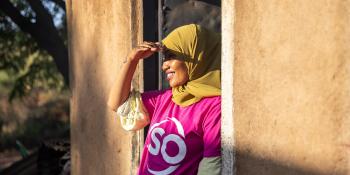
Five things women achieved this year that you might not know about
This International Women's Day, join us in celebrating the resilience of women across the globe with some female achievements you might not have heard about.
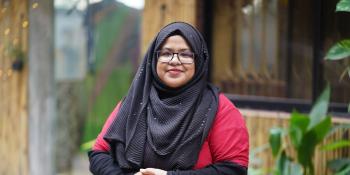
Breaking barriers: Lamia's journey of volunteering, leadership, and gender equity
Bangladesh - Lamia Tasnim's volunteering journey began in 2018, and over the course of the last six years, her passion for supporting her community has only grown.
